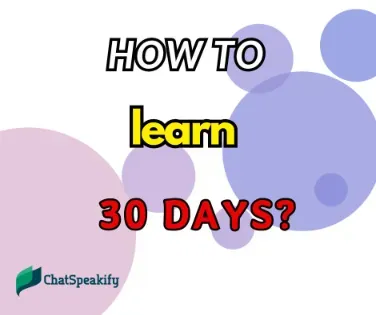A Journey Begins
Let me paint you a picture. Imagine a bright-eyed Spanish teenager named Maria. She was about to embark on a foreign exchange program in London but faced a significant hurdle—she could barely speak English. With only 30 days left before her flight, she set out on an ambitious task: mastering basic English in one month. This article will guide you through the steps Maria took, supplemented by my own experience and expertise in language learning.
Week 1: Laying the Foundation
Day 1-3: Setting Goals and Immersion
Maria knew that without clear goals, her mission would lack direction. She wrote down her objectives: being able to introduce herself, understand basic conversations, and ask for directions. You should do the same. Clear objectives create a roadmap.
Immediate immersion is key. Maria downloaded apps like Duolingo and Babbel to start her day with language exercises. Watching English movies with subtitles and listening to English songs helped her get used to the sounds and pronunciation. Try to dedicate at least two hours a day for active learning and an additional hour for passive listening or reading.
Day 4-7: Vocabulary Building and Basic Grammar
In these initial days, focus on building a robust vocabulary. Aim to learn 10-15 new words daily, starting with common nouns, verbs, and adjectives. Maria used flashcards and sticky notes around her home to reinforce her memory.
Simultaneously, she began grasping basic grammar rules. Understanding subject-verb agreement, common tenses, and sentence structure are essential. Websites like the BBC Learning English 1 and The British Council 2 offer excellent resources for beginners.
Week 2: Enhancing Skills
Day 8-14: Speaking and Listening
Maria discovered the magic of speaking with real people. She joined English-speaking forums, participated in language exchange meetups, and Skyped with native speakers. Practicing speaking daily, even if just for 10 minutes, tremendously boosts confidence.
For listening, she began shadowing exercises—repeating sentences shortly after hearing them. This technique helps with pronunciation and understanding the natural flow of speech. Maria also enjoyed podcasts like “The English We Speak” by the BBC.
Day 10: Story Technique
One of the most effective methods for language learning is to read and tell simple stories. Maria started reading short English stories and narrating them in her own words. This not only expanded her vocabulary but also improved her sentence structuring and fluency.
Week 3: Writing and Reading for Fluency
Day 15-21: Consistent Practice
Writing doesn’t only improve your ability to formulate thoughts but also reinforces what you’ve learned. Maria maintained a daily journal, writing about her day and lessons learned. Tools like Grammarly can help correct mistakes and improve style.
Reading a variety of materials—news articles, short stories, or even social media posts—enhances comprehension and vocabulary. Maria made it a habit to read one English article per day, using a dictionary to look up unknown words.
Week 4: Polish and Perfect
Day 22-27: Advanced Activities
It’s time to fine-tune your skills. Maria tackled more complex activities like listening to TED Talks and jotting down summaries. She also began writing longer pieces, such as essays or detailed opinions on her journal entries.
Day 28-30: Consolidation and Review
In these final days, review all the notes and materials you gathered during the month. Maria revisited difficult grammar rules and vocabulary that she found challenging. Additionally, she took online proficiency tests to gauge her progress and identify remaining weaknesses.
Additional Tips for Success
Consistency is Key: Dedicate at least 2-3 hours daily. Stay Motivated: Remind yourself why you started. Use Technology: Apps like Anki for flashcards and HelloTalk for language exchange. Incorporate Fun: Learn through your interests—be it sports, cooking, or music.
Conclusion: Reflect and Recognize
By the end of her 30 days, Maria was confident in her abilities to navigate everyday conversations in English. The journey was challenging but rewarding, marked by consistent effort and smart strategies.
Ultimately, learning a language in such a short time requires dedication, thorough planning, and effective resources. Embrace this journey fully, and like Maria, you too can attain impressive results. Keep pushing your boundaries, and remember, every word you learn brings you one step closer to fluency. Happy learning!
References
Happy writing!
